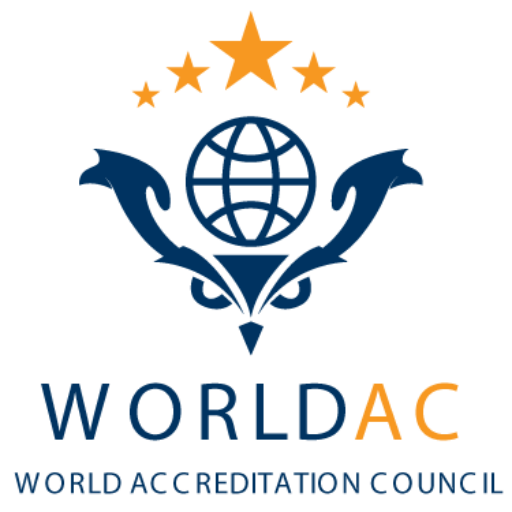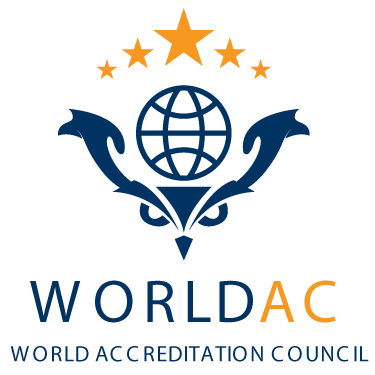ABOUT ACCREDITATION
Accreditation
Accreditation is a review of the quality of universities, educational institutes, vocational institutions, colleges, schools, distance learning centers, lifelong learning centers, online courses, corporations, agencies, professionals, and instructors. All over the world, accreditation is a major way for students, families, government officials, and the press to know that an institution or program provides quality education.
Accreditation may be either institutional or programmatic and is a voluntary, comprehensive, and objective process of outside peer review to determine whether an institution or program meets the standards of the accrediting body in institutional and/or educational quality and effectiveness. WORLDAC provides institutional accreditation for its members.
Why Accreditation Matters
Whether a college, school, university, distance learning center, or program is accredited is important for several reasons:
- Students who want governmental (and sometimes Council or organizational) grants and loans need to attend an accredited institution or program.
- Employers ask if a university, school, college, distance learning center, online course, or program is accredited before deciding to provide tuition assistance, evaluate the credentials of new employees, or make a charitable contribution.
- Governments require accreditation for institutions to qualify for grants, loans, or other funding and often mandate accreditation for students to be eligible for professional licensure exams.
What Is Accredited?
Accredited institutions include universities, educational institutes, vocational institutions, colleges, schools, distance learning centers, lifelong learning centers, online courses, corporations, agencies, professionals, and instructors. Worldwide, institutions are accredited by hundreds of international accrediting organizations. Programs are accredited by organizations specializing in specific programmatic standards.
The WORLDAC Database of Accredited Institutions and Programs provides information about thousands of institutions and programs globally. Links to the websites of these institutions are also available. Visitors can search for institutions or programs by name or by country.
Why Is Accreditation Important?
Accreditation is important because it provides assurance to the public, particularly prospective students, that you, as an education provider, meet global education quality standards. Prospective students often feel insecure accessing international markets, where local standards may not align with global benchmarks. WORLDAC accreditation provides a global reference point, transcending local regulations or practices.
Accreditation also addresses the needs of institutions offering innovative pedagogical approaches or responding to global market demands. For institutions outside traditional regulatory categories, WORLDAC accreditation offers credibility and validation.
Accreditation Type
Full Accreditation:
For institutions using traditional education methods, such as universities, colleges, schools, online education methods, such as distance learning centers, lifelong learning platforms and corporations. Full Accreditation evaluates the institution’s overall systems, including administration, organization, finances, and student services, but does not include specific programs or degrees. (1 year accreditation fee is 500$.)
Accreditation Application Steps
Application Submission
Institutions submit applications via [email protected] and receive a free consultation from a WORLDAC representative. Once reviewed, the application moves to the next step.
1 year accreditation fee is 500$.
Accreditation Status
- Accreditation and Legal Regulations:
Accreditation by WORLDAC is a voluntary, non-governmental peer review process. It confirms compliance with WORLDAC’s educational standards but does not replace legal authorization or government regulation. - Institutional Accreditation:
WORLDAC evaluates institutions as entire entities or reviews specific programs. However, accreditation is not a substitute for licensing of professions. - Global Scope:
WORLDAC focuses on global educational quality, respecting institutional autonomy and following a non-discriminatory policy. The Council is not part of any country’s government agency, ensuring neutrality and international applicability.
Benefits for WORLDAC Accredited Institutions
Accredited Institutions Are Entitled To:
- Claim accreditation by WORLDAC
- Use the WORLDAC name and seal
- Receive an official accreditation certificate
- Be listed on the WORLDAC website as an accredited member
- Promote their institution through the WORLDAC Education Network
- Access WORLDAC monitoring and feedback services
- Benefit from promotional opportunities and discounts for WORLDAC events
- Gain a competitive advantage in international recognition and global university rankings through enhanced institutional credibility
Legal Notice and Disclaimer
WORLDAC grants accreditation to educational institutes, vocational institutions, distance learning centers, online courses, and corporations, and certification to professionals, qualified individuals, instructors, and students. All such rights remain with the accredited institution. WORLDAC periodically evaluates institutions for quality and curriculum relevance but does not oversee the documents or qualifications issued by these institutions.


